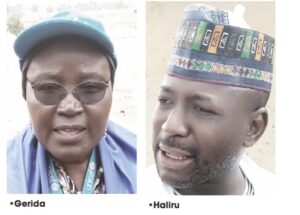From Sola Ojo, Abuja
The small village of Ungwan Kanawa, Tankaru in Dutsen-Abba Ward in Zaria Local Government Area of Kaduna State reeled from the devastation of a measles outbreak recently, with heartbreaking stories emerging from families who rejected life-saving vaccinations due to deep-seated myth, mistrust and misinformation.

According to the World Health Organization (WHO) 2024, measles is a highly contagious viral disease caused by the measles virus, a member of the Paramyxoviridae family which primarily spreads through respiratory droplets when an infected person coughs or sneezes. Its symptoms include high fever, cough, running nose, and red and watery eyes.
Perhaps, Ungwan Kanawa represents several other communities with myths and misconceptions around vaccinations.

Saudatu Safiyanu, a mother of six, shared her agony after losing four of her children to measles and severe fever.
Struggling to hold back tears, she recalled how cultural and religious misconceptions around vaccines, largely fueled by male resistance, cost her almost her entire family.
“Every mother wants to see her child healthy. You can imagine the pain of carrying each child for nine months, nurturing them with hope, only to bury them because of ignorance and fear,” Saudatu decried in her shallow-shaking voice as she shared her experience.

According to Saudatu, each time a medical team visited the village to offer vaccinations, her man would adamantly refuse to allow their children to be immunized, forcing her and many other women to hide their children away from the vaccinators.
“I pleaded with my husband many times, but he was completely against it,” she lamented.

It wasn’t until the death of four of their children that a vaccinator finally convinced her husband to relent.
Saudatu confessed that since her remaining two children received their vaccinations, they have remained healthy and free from critical illness.
“After measles killed my first four children, my husband eventually agreed to accept the vaccine. So, the two others were vaccinated and they are doing well”, she said.
Another tragic case is that of Adamu Musa, a father who lost two of his children to measles. His story is similar to Saudatu’s pain and maybe other secluded cases.
Misled by rumours and distrust, Musa had initially refused to allow his children to be vaccinated, believing it was an evil plot targeting rural communities like his.
“I thought the vaccines were harmful. I thought they were meant to harm our children.
“But now, after losing two and seeing seven of my other children admitted to the hospital fighting for their lives, I realize how wrong I was”, Musa admitted.
Musa now urges all men in the village to allow their children to be immunized, stressing the visible positive changes he has seen in his vaccinated children.
Village Head, Nasiru Yunusa, confirmed that initially, two-thirds of Unguan Kanawa’s residents were avoiding all forms of vaccination.
“Those who stubbornly resisted have sadly faced the worst outcomes. Many households have either lost children or have several admitted with complications from measles,” he said.
Yunusa noted that persistent community outreach and education have gradually started to shift perceptions. However, he warned that unless the few remaining holdouts embrace vaccination, more tragedies could follow.
Al-Hasawa Haliru, who works at heath clinic kilometres away, is one of the health workers who provide routine immunization services in the area.
“Immunization is very important because lack of it will expose the children to many preventable diseases like measles and polio among others.
“In addition to myths and misconceptions here, for a few months now, there has been a vaccine stockout in the Zaria local government area of the state.
“Again, the nearest hospital to this place is about seven kilometres at Kankarau. We thank the state government for bringing the mobile truck to take care of the basic health needs of all age groups in some of these hard-to-reach communities,” Haliru added.
UNICEF’s Chief of Field Office in Kaduna, Dr. Gerida Birukila, described the situation as alarming, emphasizing that many children suffering from measles had never been immunized.
“Three years ago, this community had a 100% refusal rate for vaccinations. Today, we are witnessing the tragic consequences,” Dr. Birukila said during an immunization campaign in the area on April 26, 2025.
“We urgently need predictable vaccination supplies to prevent further loss of life.
“Despite nationwide shortages of measles vaccines, UNICEF, WHO, and the Kaduna State government are intensifying efforts to secure and deliver doses to affected areas,” she added.
Dr. Birukila called on parents, religious and traditional leaders, and all stakeholders to encourage full participation in immunization drives to save lives.
Director of Disease Control and Immunization at the Kaduna State Primary Health Care Board, Hamza Ibrahim Ikara, confirmed that immediate steps have been taken to strengthen disease surveillance and launch emergency re-vaccination campaigns.
“Our surveillance teams are on the ground. Like I said, I visited the community in question and from my interaction with the community leaders, there has been vaccine hesitancy there”, he said.
Ikara also highlighted the critical role of community sensitization efforts, revealing that many mothers had previously been unable to immunize their children without the approval of male heads of households.
“That led us to another round of sensitization in the community for almost an hour. In the long run, with field experience and religious preaching support, we were able to vaccinate all the children in the community on April 26, 2026″, he said on Tuesday, April 29, 2025. That will improve broader community consent” he said.
Medical teams from the State government and donor agencies continue to plead with parents to save their children’s lives through simple, available immunizations. But for families like Saudatu’s and Musa’s, the lessons have come at a heart-wrenching cost, one they hope no other family will have to endure.

